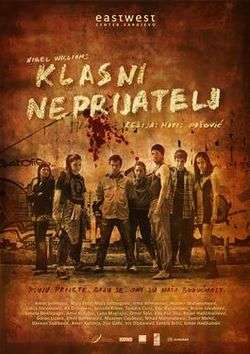Class Enemy
| Class Enemy | |
|---|---|
 Class Enemy Poster by East West Theatre Company | |
| Written by | Nigel Williams / Haris Pašović |
| Characters | Iron (Pegla), Cobra (Kobra), Sky (Nebo), Chick (Koka), Kid (Klinjo), Kitty (Ma), Cat (Ca), Deputy Headmistress |
| Date premiered | April 19, 2007 |
| Place premiered | Sarajevo, Bosnia and Herzegovina |
| Original language | Bosnian |
| Subject | Balkan, high school, bullying, juvenile delinquency, violence |
| Genre | A play |
| Setting | Classroom in Bosnia and Herzegovina |
| [www.eastwest.ba Official site] | |
Class Enemy (Klasni Neprijatelj in local language) is a play produced by the East West Theatre Company from Sarajevo, Bosnia and Herzegovina. The play was originally written by a British playwright Nigel Williams, but East West Theatre Company's production was adapted by the show's director, Haris Pašović. The original play, set in the South London classroom in early 1980s, was in Pašović's production transported to Sarajevo of 2007. The original cast consisting of six high-school boys was replaced by seven characters – three girls and four boys. The free adaptation, while keeping the original spirit and main themes, was also inspired by the research conducted in Bosnian classrooms.[1][2]
The artistic team of the Class Enemy has conducted a research in some of the secondary schools of Sarajevo and discovered alarming levels of violence among students and teachers. Findings, among other things included information that students often came to school carrying knives, that police was involved frequently, and that rude behavior during classes was a common occurrence. During just a few months, East West Theatre Company's team has recorded a number of cases of brutal violence in Sarajevo and small Bosnian towns which further informed many themes covered by the show.
Class Enemy, written in 1978 as a social commentary on the apathy and anarchy in inner city British schools, is adapted to the new European reality at the beginning of the 21st century. The set is a bleak classroom with broken tables and chairs, dirty blackboard and lit with sterile fluorescent lamps. The play starts with six students waiting for a teacher and, like Beckett’s Vladimir and Estragon, they seem to wait in vain. What the audience learns as the play unravels is that no one cares any more - at least not for these students. The female Deputy Headmistress delivers her scathing assessment, spitting the words with no compassion or understanding, and as soon as she leaves, into the break steps Pegla (Iron) - the school yard bully. He commandeers the situation, forcing each student to ‘teach’ a lesson.[3]
The show has won a number of awards including No. 1 Pick of The Year by The Flying Inkpot from Singapore,[4] Best Play Award at Singapore Arts Festival 2008, and Best Contemporary Show Award at International Theatre Festival Kontakt 2009 in Poland.[5] It has also been performed at festivals in Edinburgh (Edinburgh International Festival), Singapore, Shanghai and Sibiu Romania, as well as theatres in Ljubljana Slovenia, Novi Sad Serbia and various small towns across Bosnia.[6]
Nigel Williams' shocking 1970s play about a London school has been relocated to modern-day Sarajevo, making the pupils children of the war. This updating, by director Haris Pasovic, is subtle but important. Most obvious change is the switch from a single-sex boys' school to a mixed class of pubescent teenagers, none of whom - either male or female - can go for long without referring to masturbation or making lewd, often violent, approaches to one another. Implicit in the production is also the memory of the collapse of Yugoslavia. One student talks about the poverty he has endured since his father's killing in the war, another about the social malaise that has attracted him to Islamic extremism, and a third about the racial abuse she has suffered as a result of being a Bosnian Serb living within Bosniak ethnic majority.[7]
Cast and crew are from across the national spectrum: Serbs, Bosniaks, Croats, all full of disturbing stories of the war. The play's themes of confused social values, isolation, single-parent families, alcoholism, xenophobia and violence were a strong fit, although Pasovic tweaked cultural references somewhat and adjusted dialogue to make it more accessible to a Bosnian audience.[8]
Original Cast
| Actor | Role |
|---|---|
| Amar Selimovic | Iron (Pegla) |
| Zana Marjanovic / Maja Zeco | Cobra (Kobra) |
| Maja Izetbegovic | Sky (Nebo) |
| Irma Alimanovic | Chick (Koka) |
| Nusmir Muharemovic | Kid (Klinjo) |
| Samir Karic | Kitty (Ma) |
| Amir Muminovic | Cat (Ca) |
| Lidija Stevanovic | Deputy Headmistress |
|
References
- ↑ East West Theatre Company Official Website [cited December 08, 2011]
- ↑ New York Times: Antsy Adolescents Romp at Edinburgh Festivals by CHarles Isherwood [cited December 08, 2011]
- ↑ The UrbanWire: Class Enemy – An Enemy Of The People by Lucilla Teoh [cited December 08, 2011]
- ↑ The Flying Inkpot: Inkpot Picks 2008 [cited December 08, 2011]
- ↑ East West Theatre Company Official Website [cited December 08, 2011]
- ↑ Edinburgh Festival Guide: Foe play - Class Enemy by Malcolm Jack [cited December 08, 2011]
- ↑ The Guardian: Edinburgh festival: Class Enemy by Mark Fisher; 21 August 2008 (accessed January 17, 2012)
- ↑ The Guardian: And the lesson today is how to shoot by Kate Connolly; 7 August 2008 (accessed January 17, 2012)